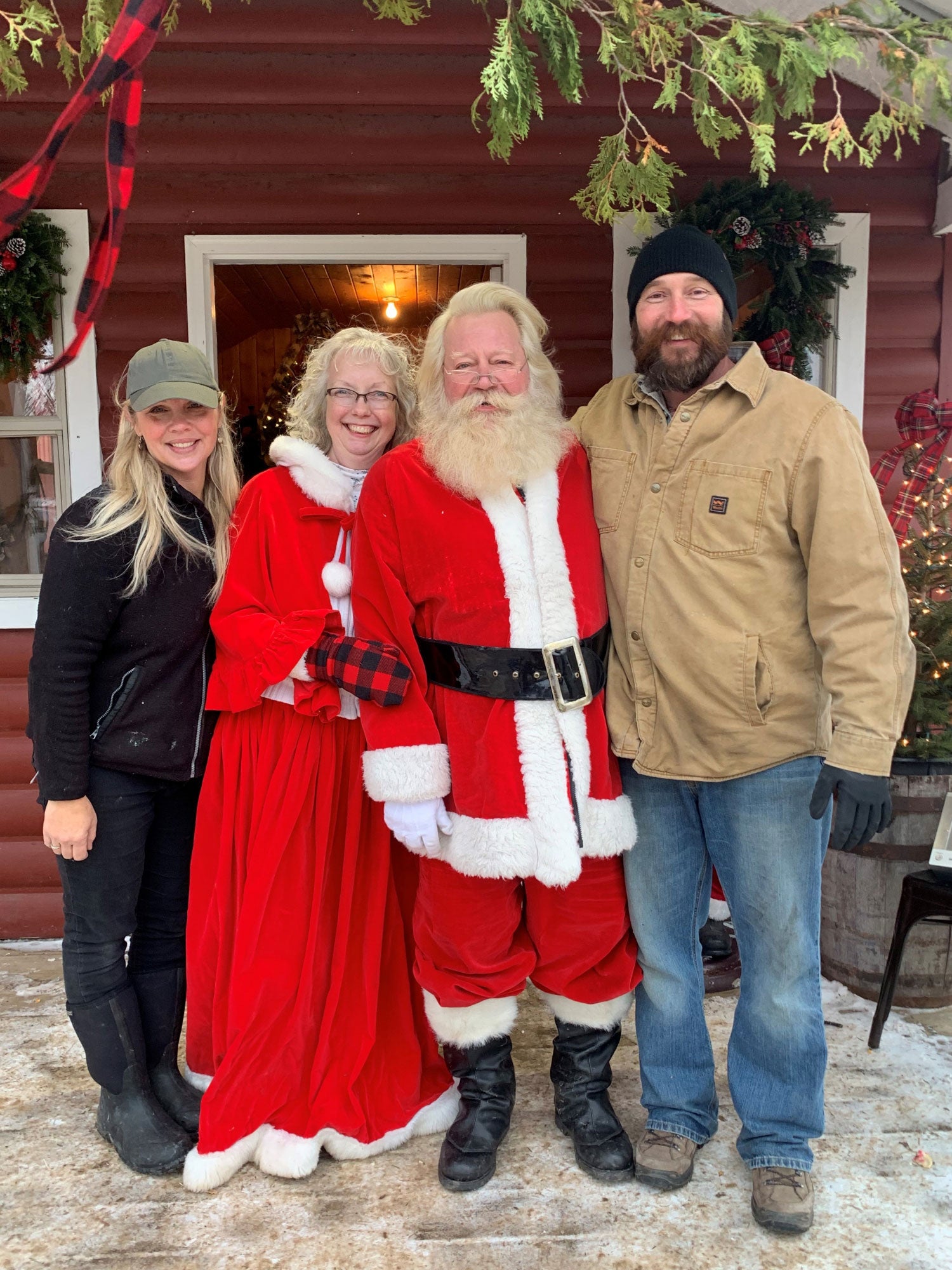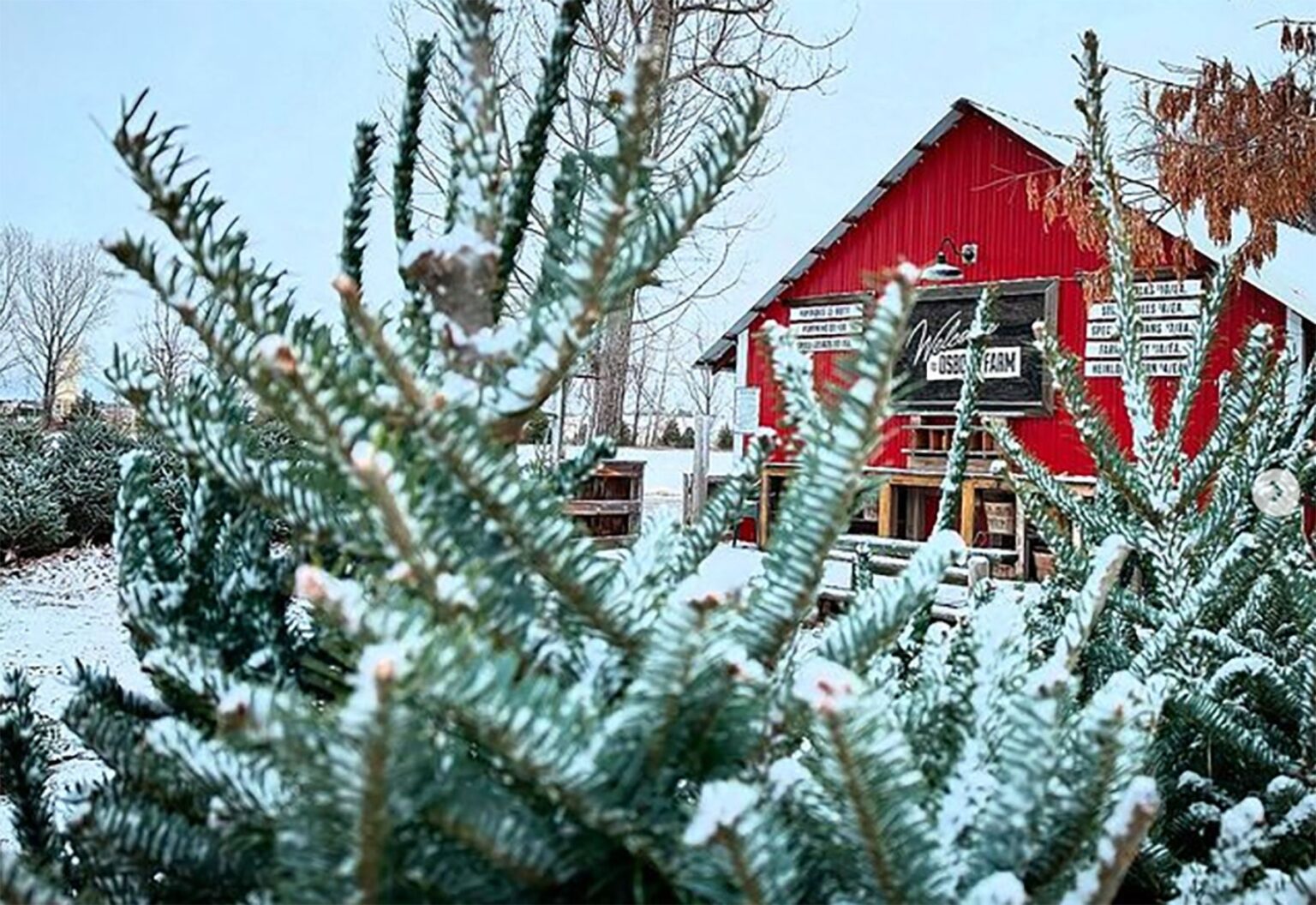Christmas tree growers nurture family memories and the tradition that comes with picking out a real tree each year.
When the holiday season gets into full swing, people across the United States begin searching for just the right centerpiece to display in their home: a Christmas tree.
Displaying Christmas trees in homes has been an American tradition since the 1820s, and today, approximately 25 million to 30 million real Christmas trees are sold each year in the U.S.
Despite the sheer number of trees sold, the trees are predominantly grown in just a handful of states such as Oregon, North Carolina, Michigan, Pennsylvania, Wisconsin and Washington. This is due to the ideal climate and growing conditions of the trees, while trees grown in different states have different conditions that they are adapted to.
At Dutchman Tree Farms in Manton, Michigan, the trees thrive on the well-drained soil and climate. Kate Dodde, the account manager for Dutchman Tree Farms, explained how the Michigan climate of “moderate temperatures and regular rainfall is ideal for healthy, strong growth.”
The farm has about 10,000 acres, a mixture of leased and own land, and the operators there plant about 1 million trees a year. Dutchman produces approximately 750,000 trees per year, selling both direct to consumer as well as to wholesale retailers.
Dodde got her start at the farm flying drones over the farm to visually assess the tree fields.
“We assess the tree count and height,” she said. “It takes anywhere from 8 to 12 years to get a tree to market, so that means that we have to have a lot of trees in production in order to maintain [the supply].”

Dutchman Tree Farms grows nine varieties of trees, ranging from 3 feet to 50 feet tall to meet the demands of their customers. The farm planted its first tree in 1960, and today is family-owned and operated by Joel and Gale Hoekwater and Chris and Sarah Maciborski, the fifth generation working the farm.
The farm includes a nursery and a greenhouse, where seedlings are started. The seedlings grow until they are hardy enough to be transplanted into the field to grow into maturity.
“Depending on variety, different seedlings are different sizes. … But a minimum of 12 inches, [or] 18 to 24 inches is a good seedling to get started with [for transplanting],” said Dodde.
Dodde spoke about how many people don’t realize the amount of work going into the cultivation of the trees during their life cycle.
“One of the good things that I think a lot of people don’t realize, especially when they buy a real Christmas tree, is that we’re actually farming them,” she said. “We’re not going out and cutting them down out of the woods. We’re cultivating them specifically to be Christmas trees and to be sold.”
With that cultivation comes a lot of labor year-round despite the temporality of the Christmas season.
“People always ask what [we] do when it’s not Christmas, and as other farmers would know, obviously there’s lots of field work to do. We trim the trees. We do some irrigation. We have to treat fungus and pests and all of the good stuff that goes with farming,” Dodde said.
When the trees are ready for harvest, the trees can travel hundreds of miles to their destination to reach consumer’s homes. One such destination is Osborn Farm, a family-owned and operated farm located in Loveland, Colorado, that sells trees grown by Dutchman Tree Farms.
When the order from Osborn Farm comes in, Dutchman Tree Farms cut, package, and ship the trees within one week. Once the trees arrive in Colorado, Osborn Farm works quickly to unpackage and stage the trees on their farm.
A centennial farm in Colorado, Osborn Farm grows decorative pumpkins for the fall season and decided to expand to offer Christmas trees about a decade ago.
Conor Osborn, the seventh-generation of the family to manage the farm, said cultivating the Christmas spirit for his community was a big factor in offering trees on the farm.
Yet as a 110-acre operation, Osborn Farm doesn’t have the land accommodation to grow trees themselves.
“[We] don’t grow the trees here in Colorado, the climate isn’t right [for that],” said Osborn. “But we try to offer something other than chain link fence trees in a lot.”
Osborn said it’s about providing the environment for sweet childhood memories.
“When you think back to memories of Christmas, you probably don’t remember the toy you got when you were 5. You remember the sensory details, like the smell of the tree, the memory of picking out the tree each year,” he said.
The farm offers a backdrop for this family experience, with a meet-and-greet Santa event, coffee and hot chocolate food truck, and the trees on display for families to look at them from all angles to find the perfect one for their home.
Osborn Farm is open only on Saturdays and Sundays, yet has hundreds of visitors each weekend. The farm offers several varieties of trees, with the most popular being a frasier fir.
“The frasier fir has better needle retention, and is oftentimes referred to as the ‘Cadillac’ of trees,” said Osborn. “In my opinion, once you get them in a warm house, they smell fantastic and that scent will fill your home for the holidays. … It’s our most popular one by far.”
Osborn also talked about the scotch pine, which he said was an excellent choice for apartments or smaller homes.
“They’re only about four to five feet tall, with a sharper needle, but they’re real short, [which] is great for people that live in an apartment or somewhere smaller like that,” he said.
Another option was the black hill spruce, which he said “is a very thick tree that’s a really, really deep dark green. I joke that if you don’t want your cats climbing up on your tree, this is the one for you,” he laughed, citing its very sharp bristles as a good deterrent for cats.
No matter the criteria, Osborn Farm works with each of their customers to ensure they find the perfect tree for their home — and offers a full refund if it doesn’t work out.
Since it’s a real tree, Osborn notes that maintaining it throughout the holiday season is necessary.
“We always ask [whether it’s] kept by a window so it gets a little bit of colder air to it, whether they have it by a fireplace, stuff like that,” he said. “I mean, if you put it in a home and you crank the thermostat up to 72, the needles are going to drop.”
Osborn offers a lot of advice to customers on how to properly care for their tree, including using warm water in the tree stand at home, as that will help loosen up the sap and help the tree uptake water more easily.
Osborn said he likes to make the tree care part of the family tradition in his own home — he will ask his kids to check on the water, refill the reservoir when needed, and drive home the message that this is a live tree that needs attention and care.
And since it’s a live tree, the tree can find purpose after the holidays too.
“When I was a kid, we had different ponds here [on the farm] and we would put [the tree] out on the ice, and then when the ice melted and the tree sank, it became a fish habitat on the farm.”
The city of Loveland also offers a Christmas tree drop off service, where the trees are mulched and used for other tree and plant bed covers in the city.
“I’ve also heard some people will throw them to their goats or their chickens and they’ll eat the Christmas trees,” said Osborn.
While some folks may criticize the cutting of a live tree simply for an ornamental decoration, live trees can actually be the more long-term sustainable choice in terms of wildlife habitats. And Osborn cites the wonderful memories that accompany picking out a real tree each year and the traditions that come from choosing a real tree and taking care of it, compared to a plastic tree.
Back in Michigan at Dutchman Tree Farms, the trees grow for years and provide a habitat for the animals and wildlife there as well.
“Real Christmas trees are a renewable resource — they’re grown specifically for the holiday season, and for every tree harvested, farms plant one or more in its place. At the end of their use, they’re biodegradable and can be turned into mulch or compost,” Doddee said. “In contrast, artificial trees are made from non-biodegradable materials and require significant energy to produce, making real trees the greener choice.”
Not to mention that cultivating and buying live trees support these two family businesses, which have been in operation for multiple generations.
Both Osborn Farm and Dutchman Tree Farms hope to provide a wonderful holiday experience to their customers, and love that they can provide real trees for families.
“It’s really one of my favorite parts of the job because we get to see over a decade of [our hard] work, and the joy that it brings people … [getting] to be the center of a family’s tradition and knowing we get to be a part of that is just really a beautiful thing,” said Dodde.
Liza Thuy Nguyen served as the 2023 American Farmland Trust Agriculture Communications Intern at AGDAILY. Liza is originally from Anaheim, California, and attended the University of California, Davis, as a first-generation college student. She received a bachelor’s degree in genetics and genomics and went on to earn a master’s in horticulture from Penn State.


